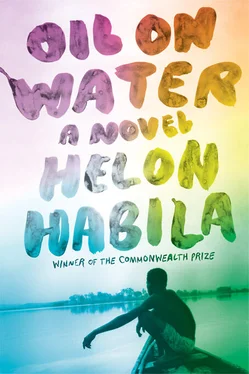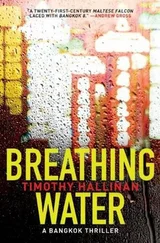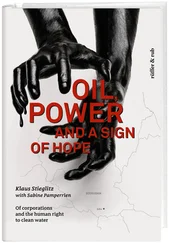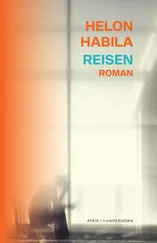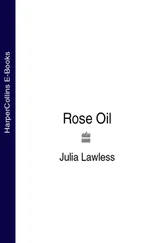— Sorry, sir, no be him fault. Na small pikin, sir.
The old man bowed down his head when he had finished speaking, ready to take on himself whatever blow was meant for his son. For a moment the soldier looked as if he would reach out and drag the boy out of his father’s arms and force him to answer the question, but then he turned away from the two and faced his men.
— Put them with the others!
The soldiers grabbed the old man and his son and led them to the seven kneeling men. I noticed how puffy and sleep-deprived the eyes of the seven men looked. I stepped forward to protest to the Major but a hand on my wrist pulled me back. I shook off the hand, thinking it was one of the soldiers, but it wasn’t. It was the Doctor.
— Wait. This is not a good time to talk to him.
The Doctor looked tired. We watched as the Major berated the men in a loud, but surprisingly passionless, voice.
— You call yourselves freedom fighters? To me you are just crooks and I will keep hunting you down and shooting you like mad dogs. This country is tired of people like you. Sergeant, bring the watering can!
The Sergeant was standing with five other soldiers under a tree, close to the kneeling men, and at the Major’s order he picked up a rusty iron watering can from the ground and took it to the Major. I sensed a hush descend on the men. The soldiers seemed to have forgotten to raise their guns and point them threateningly at the kneeling men. The Doctor shifted on his foot and I heard his sharp intake of breath as the Major raised the can and started to pour the water on the head of the man on the outer right. Then the unmistakable acrid smell reached me.
— Is he pouring petrol on them?
The Doctor nodded. I pulled away from him and in a few steps I was standing beside the Major, and when he turned and glared at me my courage faltered and for a moment all I could do was shake my head and point at the boy and the old man.
— Major. We are really sorry if we broke the law by coming into these waters. But we were invited by the kidnappers. . and this man and this boy, they work for us. They’re innocent. Let them go. Please. We just want to find the kidnapped woman and to interview the militants, that’s all.
The Major turned and stared at me for a while before speaking, and then with each word he poked a finger into my chest.
— Listen, here I decide who is a criminal and who is not. I say who is a good egg and who is bad. Don’t dare to tell me what my job is. Remember, you could easily be there on your knees with them. You are still not free of suspicion. Don’t forget that.
He turned away, stretched out his hand and commenced dripping oil on the bowed heads. I returned to the Doctor, shaken. I turned away so as not to watch the shock and pain and frustration on the bowed faces as the precious, corrosive liquid touched their skins. The Doctor also looked away toward the water, lost in some detail of the ruined, decomposing landscape. But I couldn’t turn my face away for long. I was a journalist: my job was to observe, and to write about it later. To be a witness for posterity. I witnessed the stoic and anticipatory posture of the kneeling men. I witnessed the brutal anointing in silence, smelled the reek of petrol hanging in the air, pungent, and I wondered how the men could stand it. Already I felt sick and dizzy from the fumes. I had never liked the smell — it brought up memories in me, memories I would rather have kept down.
— This isn’t the first time this has happened, is it?
— No. It’s not.
The Doctor sounded agitated, but his eyes remained fixed on the Major, who was moving up the line, systematically dousing the bowed, cringing heads.
— Look at the soldiers, look at their eyes, all feverish with excitement and expectation.
— Expectation of what?
— Of the day when the Major will strike a match and throw it at the bowed, petrol-soaked heads. One day it will happen — see how the Major’s hands shake with the temptation.
The Major’s loud mocking voice cut the air.
— What, you can’t stand the smell of oil? Isn’t it what you fight for, kill for? Go on, enjoy. By the time I’m through with you, you’ll hate the smell of it, you won’t take money that comes from oil, you won’t get in a car because it runs on petrol. You’ll hate the very name petrol.
— They say he became like this after his daughter was raped. She was only eighteen. A student at the university. She was the brightest in her class, she was studying to become a doctor. .
— You want resource control? Well, control this. How does it feel? This will teach you to kidnap innocent children. This will teach you to terrorize innocent villages.
— One day she’s walking to the hostel from the library, it’s late at night, she has an exam the next day and she’s been reading and doesn’t know it’s so late. Then a car pulls up beside her and she’s offered a lift. She recognizes one of the faces, a classmate. She gets in.
— Sergeant! Get me more petrol. These people are so thirsty. They drank it all up. Would you believe that? Hurry up.
— But the car doesn’t take her to her room. They head for the city. She begins to scream when her pleading to be taken back to the hostel meets with only drunken laughter. They take her to a strange room in some run-down hotel and lock her up in the wardrobe after sealing her mouth with duct tape. They leave her there all night. That boy that she recognized, he was about to be initiated into a campus fraternity, and part of his initiation ceremony required rape, and he had to supply the girl. .
One of the men returned with the watering can and handed it to the Sergeant, who handed it to the Major.
— So, where were we, who is next?
— She only happens to be in the wrong place at the wrong time. The next day, they take her to a graveyard and rape her repeatedly, then they let her go. The frat boys didn’t think she’d give up their names; besides, one of the boys was some minister’s son. But she did. Nothing happened to him, of course; he was only suspended from university for a semester. The Major here, he took it calmly, surprisingly. Many thought he’d lose his head and maybe shoot the boy, and in anticipation of this the boy’s father sent his son away to a university in London. Well, the Major is a patient man. He waited. A year later the boy came home for Christmas. The Major heard about it and one night he got two of his men and went to the boy’s favorite nightclub and abducted him right in front of everyone. They took him to the graveyard and shot him in the groin after breaking his four limbs. He didn’t die. They made sure of that. He phoned his father, who came and got him and flew him overseas for treatment. The Major was arrested, and court-martialed. The army sent him away to this place as punishment, and he’s been here three years now. One day he’s going to light that match. Even his men know it. Just a matter of time.
— What happened to his daughter?
— They said she transferred to another university in the north, Zaria or Maiduguri, and completed her studies.
The boy, Michael, was last in line. The Major was as conscientious with him as he was with the others, making sure the petrol found every exposed surface on the boy’s face. I witnessed the boy desperately spitting out the petrol as it ran down his face, wiping his eyes and nostrils with the sleeve of his homespun shirt, but the friction from the wiping only chafed his skin, inflaming it, making the petrol sting harder. I promised myself that if I got out of here I’d write about this, every detail, every petrol trickle, every howl of pain. Now I knew what Zaq meant when he said so long ago in that lecture that this job will sometimes break your heart. He said journalism shows you firsthand how nations are built, how great men achieve their greatness. And then he had quoted the proverb about how elephants achieve their great size: they simply eat up everything that stands in their path, trees and ants and plants and dirt, everything. I lowered my head to control the rage. I felt impotent, helpless, like a man running in his sleep with his legs crossed. At last the Major flung away the empty watering can. He strode over to us, his face contorted by some obscure rage. He was breathing hard.
Читать дальше
